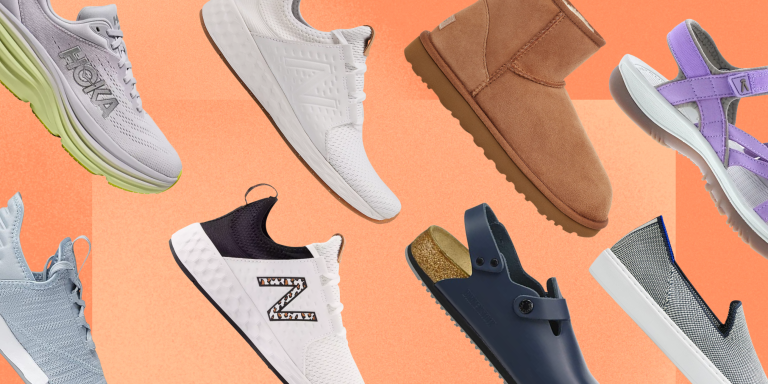
Pregnancy brings a host of body changes, so naturally, your wardrobe will change with it. In addition to some comfy maternity leggings and jeans, you’ll probably want to pick up a new pair of walking shoes, too. That’s because your feet are also liable to all sorts of changes during pregnancy. You don’t have to give up your daily walks as a result, but you should find a good pair of shoes to accommodate your tired, achy feet—because they deserve all the support they can get during this time.
Why do your feet change during pregnancy?
Depending on the person, pregnancy can cause feet to flatten, widen, or increase in size. This is partly due to fluctuations in the hormone relaxin during pregnancy, Madison Tincher, DPT, a physical therapist at Holston Medical Group in Kingsport, Tennessee, tells SELF. She explains that relaxin’s main purpose is to, well, relax the ligaments and muscles around your pelvis, but the loosening effect isn’t confined to one part of the body. It can happen anywhere, including your feet. When the ligaments in your feet are relaxed and you put pressure on them by walking and standing, your arches may fall, and thus, flatten your feet, Jeffrey DeLott, DPM, a board-certified foot and ankle surgeon at Connecticut Orthopaedics, tells SELF.
Dr. DeLott says that certain cardiovascular changes during pregnancy can be another key factor in how your feet fare. Blood volume increases in the body to support a growing fetus, and that can put extra pressure on your veins in general, he says. And, as your pregnancy progresses and your uterus grows, the pressure on your veins will largely increase in your legs, which makes it harder for blood to flow back up to your heart. This can cause fluid to collect in your ankles and feet, which will often lead to uncomfortable swelling, Dr. DeLott explains.
How can pregnancy affect your feet over time?
Unfortunately, these changes can be uncomfortable, if not downright painful. Dr. Tincher says your body will likely compensate for fallen arches by changing your gait: “Smaller muscles are having to do bigger jobs and bigger muscles are shutting off, so they’re not as active.” For example, your knees may turn inward, which can cause your hips to turn inward, too; this can lead to an uncomfortable pinching sensation in that area and back pain. Flat feet can also contribute to plantar fasciitis (one of the most common causes of heel pain) and tendonitis in your Achilles tendon, which refers to inflammation in the back of your heel and ankle, Dr. DeLott says.
If you experience swelling, your feet in general will probably hurt. (You can try to alleviate the pain of swollen feet by elevating them and wearing compression socks.) Another common effect of pregnancy is that it changes your center of gravity—meaning, it may be more difficult to maintain your sense of balance as your body changes, which can make it challenging to walk comfortably and confidently, Dr. DeLott says.